- Home
- Dusty Richards
The Abilene Trail
The Abilene Trail Read online
Table of Contents
Title Page
Copyright Page
Dedication
Introduction
Chapter 1
Chapter 2
Chapter 3
Chapter 4
Chapter 5
Chapter 6
Chapter 7
Chapter 8
Chapter 9
Chapter 10
Chapter 11
Chapter 12
Chapter 13
Chapter 14
Chapter 15
Chapter 16
Chapter 17
Chapter 18
Chapter 19
Chapter 20
Chapter 21
Chapter 22
Chapter 23
Chapter 24
Chapter 25
Chapter 26
Chapter 27
Epilogue
BUSHWHACKED
Ben passed the Logan place and was winding up through the cedars to get up on the mesa when a shot splintered the top of the sideboards behind the spring seat. If the shooter had been a little better, Ben knew he’d have been pushing up daisies.
In response he shouted at the bays and went to throwing them the reins. He needed out of this brushy mess before the bushwhacker took another potshot at him. At the top of the ridge he’d have this back-shooter out in the open, if he wanted to go after him.
The cedar’s boughs rushed by. The ruts and rocks threw Ben from side to side, but he managed to stay on the spring seat. Another shot cracked above the clatter of wagon, charging horses, and harness. He hurried eastward, shouting at them to run, glancing over his shoulder for any sign of pursuit. Someone wanted him dead. He had good evidence in the splintered sideboard. He drew up, used his foot on the brake handle, and reined the horses down to a walk.
The Spencer close by, he was ready in this open brown grassland for a fight. He bet the coward wouldn’t come out. He let the horses stand and catch their breath. With the brake set and the reins tied off, he searched the western horizon. No shooter. That was all right. His time would come.
SIGNET
Published by New American Library, a division of
Penguin Group (USA) Inc., 375 Hudson Street,
New York, New York 10014, U.S.A.
Penguin Books Ltd, 80 Strand,
London WC2R 0RL, England
Penguin Books Australia Ltd, 250 Camberwell Road,
Camberwell, Victoria 3124, Australia
Penguin Books Canada Ltd, 10 Alcorn Avenue,
Toronto, Ontario, Canada M4V 3B2
Penguin Books (N.Z.) Ltd, Cnr Rosedale and Airborne Roads,
Albany, Auckland 1310, New Zealand
Penguin Books Ltd, Registered Offices:
80 Strand, London WC2R 0RL, England
First published by Signet, an imprint of New American Library,
a division of Penguin Group (USA) Inc.
First Printing, October 2003
Copyright © The Estate of Ralph Compton, 2003
Map copyright © New American Library, 2003
All rights reserved
REGISTERED TRADEMARK—MARCA REGISTRADA
eISBN : 978-1-101-17746-4
http://us.penguingroup.com
I’m dedicating this book to Jim Parker of Yukon, Oklahoma, a grand man who dedicated his life to preserving the history of the Chisholm Trail; to Cotton Clem, who went with me to learn all about the cattle road; and to the National Chuckwagon Racing Championship that each Labor Day weekend on the Bar Eoff Ranch, Clinton, Arkansas, keeps our Western traditions alive and rolling.
—Dusty Richards
THE IMMORTAL COWBOY
This is respectfully dedicated to the “American Cow boy.” His was the saga sparked by the turmoil that followed the Civil War, and the passing of more than a century has by no means diminished the flame.
True, the old days and the old ways are but treasured memories, and the old trails have grown dim with the ravages of time, but the spirit of the cowboy lives on.
In my travels—to Texas, Oklahoma, Kansas, Nebraska, Colorado, Wyoming, New Mexico, and Arizona—I always find something that reminds me of the Old West. While I am walking these plains and mountains for the first time, there is this feeling that a part of me is eternal, that I have known these old trails before. I believe it is the undying spirit of the frontier calling, allowing me, through the mind’s eye, to step back into time. What is the appeal of the Old West of the American frontier?
It has been epitomized by some as the dark and bloody period in American history. Its heroes—Crockett, Bowie, Hickok, Earp—have been reviled and criticized. Yet the Old West lives on, larger than life.
It has become a symbol of freedom, when there was always another mountain to climb and another river to cross; when a dispute between two men was settled not with expensive lawyers, but with fists, knives, or guns. Barbaric? Maybe. But some things never change. When the cowboy rode into the pages of American history, he left behind a legacy that lives within the hearts of us all.
—Ralph Compton
The Abilene Trail
Introduction
During the Civil War, the American people ate every chicken and pig in the land. After that conflict, the industrialized North was hungry for protein. In Texas and old Mexico, there were thousands of unbranded longhorn cattle for the catching.
In the years following their bitter defeat, many impoverished Texans headed large cattle herds toward that old North Star, looking for the rich markets. Some returned to brag of their success; others cursed their bad luck, for they lost fortunes in cattle to bushwhackers, rustlers, irate farmers, and natural disasters.
An Illinois farmer, Joe McCoy, spent two years trying to convince one of the railroads to set up shipping yards beyond the sod buster’s Texas Tick Fever dead-lines. At last, this ambitious man in his simple store-bought clothing and muddy shoes found a railroad president who took him seriously.
Joe McCoy started building loading pens at Abilene, Kansas, in the fall of 1867. That winter McCoy hired a surveyor and his sons to plow a furrow from his pens at Abilene to near the site of Jesse Chisholm’s trading post (Wichita, Kansas) to show them the way. Joe also sent salesmen to Texas armed with posters showing this route west of the trouble with farmers and the promise of a good market.
The trail was known as the Abilene Trail until the early 1870s, when the drovers began calling it Jesse’s Trail.
Chapter 1
November 21, 1867
Kerr Mac County, Texas
“You ever been to Kansas, Mark?” he asked the wide-eyed teenager.
“Kansas?” The youth threw his hands up to shade his eyes from the noontime sun. “Hell—I mean, no, sir.”
Ben McCollough looked over at the woman who had come to the doorway of the paintless house. At thirty-two, Jenny Fulton was an attractive enough widow with three boys. Mark, her eldest, stood before Ben’s roan horse, all eaten up with the notion of being asked to make his first cattle drive. The light brown- haired woman standing in the threshold could use the money her son would earn. As a consideration to her, Ben would have to see that some of the boy’s pay managed to make it home.
“Hello, Jenny,” he said, straightening his spine in the saddle and removing his high crown hat for her. Her willowy figure in the faded, wash-worn dress was enough to make his guts roil.
“Hello, Ben. You must be needing some help today.” The warm smile showed her even, white teeth, and she pushed back an errant wave of hair from her face. Her steps looked dainty as she walked toward them. By her age, most women’s feet were splayed out from being without shoes so long—but not Jenny’s.
“I was asking Mark if he had time to go to Kansas this n
ext spring.”
“I see,” she said, using her hand to hold back her hair and also shade her eyes. “He’ll turn sixteen next month.”
“I know. Been some younger boys than that go up the trail. Could you spare him for a few months?”
“Sixteen these days and you’re a man, aren’t you?” She shook her head as if in mild disbelief.
He stepped off the roan and dropped the reins. All summer and half the fall he’d thought about courting her and done nothing. A couple of times he’d sent a deer carcass over so she and the boys had meat. His cook, Hap, had delivered them to her. Each time afterward she sent him a nice thank-you note in her gracious penmanship with a whiff of sweet perfume on the notes.
“Yes, I reckon the war . . .” He regretted mentioning the war. The conflict had taken her husband, Allen Fulton, leaving her with the three small boys to raise alone.
“Changed all our lives,” she said, and nodded.
“If it’s all right, then Mark needs to get his gear ready. I’ve got him a good saddle at the ranch.” Ben knew the boy’s worn-out saddle would never make it up the trail.
“Mark?” she said.
“Yes?”
“I guess you better tell Mr. McCollough what you aim to do.”
“Go to Kansas!” he shouted, and threw his felt hat in the air. “Yahoo!”
“Well, how many more hands do you have hired, Ben?”
“Actually, he’s the first.”
“That’s a nice compliment,” she said to her eldest.
Ben nodded that he heard her. “Hap has a good milk cow over at the ranch. I need to board her while we’re going up the trail.”
Her face beamed at his offer. “I’d sure be pleased to have one. My heifer’s went dry.”
“Guess tomorrow, then, Mark can make his first cattle drive and get Jersey over here.”
“Thanks, Ben,” she said with her gaze focused on the ground. She looked up, wetting her lips. “I do appreciate the many things you’ve done for me and the boys.”
He shook his head to dismiss her compliment.
“No.” She reached out and patted his arms folded over his chest. “You need to come over and have supper with us. So we can repay your generosity.”
He felt trapped. No need in her fixing him supper—why, she had trouble enough feeding her boys, let alone feeding him. Where she’d touched his forearm, he noticed the spot felt on fire. “I’ll be real busy—”
“You have to eat sometime. You can send word by Mark. But promise you will come eat with us one night?”
“I will . . . I’ll come eat with you.”
A warm smile of relief swept her smooth face, and her blue eyes twinkled.
At thirty-nine years old, he worried about their age difference. He wasn’t a kid any longer, though at times he felt like one, especially when his thoughts ran to her. Lots more things to worry about than his mushy feelings. There were a million details to getting a cattle drive on the way, and this shipping point at Abilene wasn’t next door—a far ways from it.
He put his hat back on his head. Even in her working clothes, though he wondered if she owned any better, she looked nice. But was he ready for a woman in his life? This trail drive could be the difference between his being some two-bit rancher and being a real one. Maybe . . . maybe after the drive he would finally need a lady in his life.
“Mark, you come over tomorrow and get the jersey cow for your mom. Then ride back the next day and take you a bunk. We’ve got lots of getting ready to do.”
“Thanks, mister—I mean, Ben.”
“What night are we having this supper?” he asked her.
“Sunday night soon enough?”
“Yes, ma’am. Don’t go to no bother, hear me?”
“Oh, no. Just be usual fare.”
“Thanks. See you Sunday,” he said, and reined the roan around for home. What had he agreed to? Only eating supper with her so far. What could that hurt? On one hand, he wanted her for his own; on the other, he wasn’t damn well certain that he wanted a woman like a ship’s anchor around his neck. So what would it be? He’d have to see. Have to figure it all out somehow.
At sunup, Hap was pouring coffee in Ben’s cup. The grizzle-faced former sergeant swung around the stiff leg that he had received at the battle of Pea Ridge and gathered their breakfast dishes. Both stock dogs were raising Cain out front of the house when Ben went to the kitchen window to see who was out there.
“Mark’s already come for the jersey cow,” he said, amazed how early the boy must have gotten up to have ridden there. He’d completely forgotten about the anxiousness of youth.
“Making her that cow as a gift?” the white-whiskered cook asked.
“Loaning it to her while we go to Kansas.”
“Loaning it?” Hap scoffed. “We talked about selling her last I heard anything about her.”
“Aw, shut up. I told you her cow died. It’s for her use till we get back.”
“I ain’t milking two cows when we get back.”
“Hush up ’fore that boy hears us arguing.”
“By damn, Ben McCulloughie, I don’t aim to milk two old cows.”
“No one asked you to—now hush.”
Hap went off grumbling to himself and rattling metal pans in the dry sink, doing the dishes.
“Come on in, Mark,” Ben said to the boy, who stood with his hat in his hand in the doorway. “Better yet, you wash up out there and then come in. Hap, you have any food left for a starving boy?”
“How can he be starving?” Hap asked with his hands set upon his narrow hips.
“ ’Cause all teenage boys have got a holler leg for food.”
“I’ll whip him up some eggs,” Hap said, sounding put-out and making lots of noise taking the covers off the top to restoke the fire in the range. “A damn cook’s job is never done around here.”
“But ain’t you lucky,” Ben said, blowing the steam off his coffee.
“How’s that?”
“You’ve got someone to cook for.” Ben chuckled to himself.
“You think I can’t find work? Let me tell you, Ben McCulloughie, I can find work quicker than you can blink your eyes.”
“Sure you can, Hap. Why, there’s lots of greasy-sack outfits going up the trail would love to have you cooking for them.”
“And I ain’t never going to Kansas with no damn pack train. I could find me a job with a wagon outfit.”
“Why?”
“What do you mean, why?”
“You’ve already got a job with one with me.”
Hap scratched his sideburns. “Now you’ve gone and made me forget why I was so mad at you in the first place.”
Ben knew the answer, but he damn sure wasn’t going to remind his cook. There’d be lots of time on the trail to think about all of it—for him the picture of Jenny Fulton standing in the doorway the day before was going to eat a hole in his guts before he ever got out of Texas.
Chapter 2
Ben spent most of the morning making more plans for the drive. Through the open front doorway, he could look across the brown grass meadows to Coot er’s Bluff above Wild Hoss Creek. The horse herd he had begun to collect for the drive was grazing in the bottom: bays, blacks, a few grays, and some roans. He’d need at least five head per man. Sunlight danced on the cedars and live oaks. November was good time in the hill country. This cattle-driving business could provide him with the land to expand his herd. At thirty-nine, he couldn’t expect to forever be some two-bit rancher—the MC brand needed to be on more mother cows. He needed a couple of them purebred roan bulls to use on his longhorns. Ranching wouldn’t always be rounding up wild-as-deer cattle mavericks out of the brakes and mesquite thickets.
He drummed his finger on the letter that Col. Joe McCoy’s man, William Blair, had left. North is hungry for beef. Top steers will bring as much as forty dollars per head at our new pens in Abilene, Kansas. Forty dollars. Ben tried to erase the price tag from his mind. Four-ye
ar-old steers on the Mexican border could be bought for a few dollars. Even if he could sell enough of them at, say, twenty bucks, the size ranch he wanted could be a reality at those prices.
The best interest rate he could find so far was fifty percent. For that loan he had to pledge all his resources, ranch, horses, and mother cows. But he could borrow up to three thousand dollars—that would be enough by his mathematics to purchase eight hundred head of steer and head them for Kansas when the grass broke its dormancy next spring.
He drummed his fingertips on the tabletop. If he failed he’d have nothing but his callused hands, and he’d have to start all over, like when he came back from the war. That was why he had not dared court Jenny Fulton the past year. His whole life teetered on making a successful drive—then he could make plans for a future life. He listened to the horses and then the drum of hoofbeats. Someone was coming. He rose to his full six-foot-four and stretched his hands over his head. The reach took some of the stiffness out of his back—he felt more and more of that tightness getting up in the morning.
“Mr. McCollough, you home, sir?”
He ducked the lintel and straightened to smile at the freckle-faced boy Mark’s age. Billy Jim Watts was riding a long-headed bay horse.
“Mark said you was hiring hands to go to Kansas.”
Ben nodded. “You come to apply.”
“I sure . . . Yes, sir.”
“Kin you rope?”
“Some.”
“Kin you ride a pitching horse?”
“If I can’t I can sure get on him again.” He dismounted off his bay and jerked his wash-worn pants down so they fit more comfortable.
Amused at the eager boy’s answers, Ben chuckled in his throat. “Your mama know what you’re doing?”
“Yes, sir.”
“How’d she take it?”
“Like most women.” Billy Jim made a face. “Kinda wet-eyed. You know what I mean?”

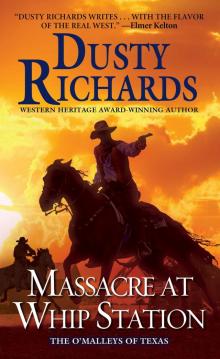 Massacre at Whip Station
Massacre at Whip Station Blue Roan Colt
Blue Roan Colt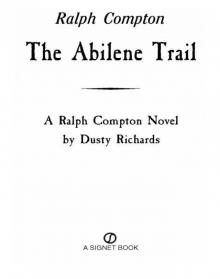 The Abilene Trail
The Abilene Trail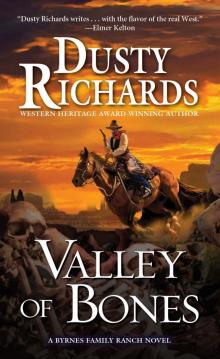 Valley of Bones
Valley of Bones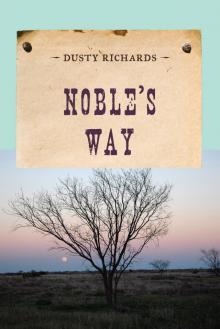 Noble's Way
Noble's Way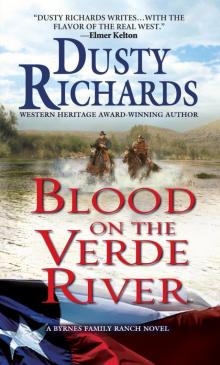 Blood on the Verde River
Blood on the Verde River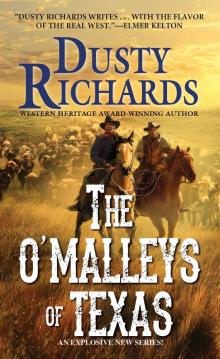 The O'Malleys of Texas
The O'Malleys of Texas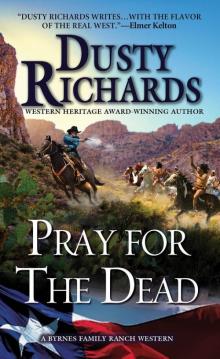 Pray for the Dead
Pray for the Dead Arizona Territory
Arizona Territory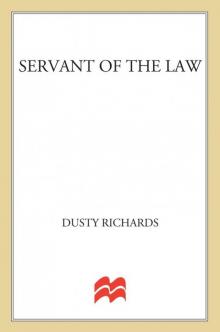 Servant of the Law
Servant of the Law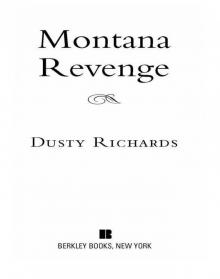 Montana Revenge
Montana Revenge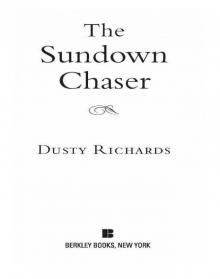 The Sundown Chaser
The Sundown Chaser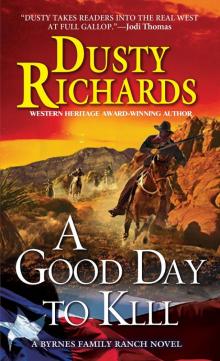 A Good Day To Kill
A Good Day To Kill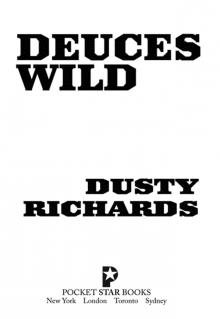 Deuces Wild
Deuces Wild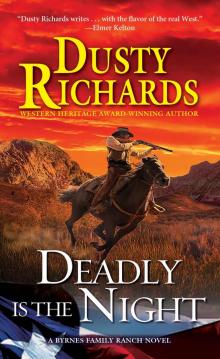 Deadly Is the Night
Deadly Is the Night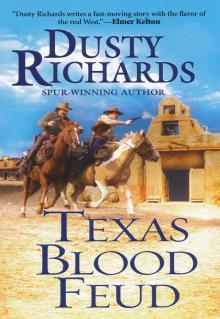 Texas Blood Feud
Texas Blood Feud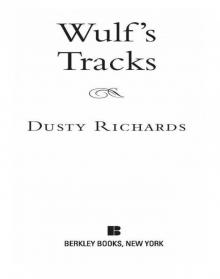 Wulf's Tracks
Wulf's Tracks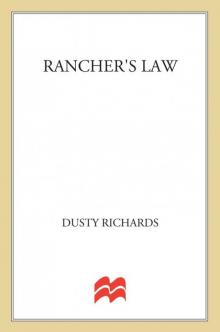 Rancher's Law
Rancher's Law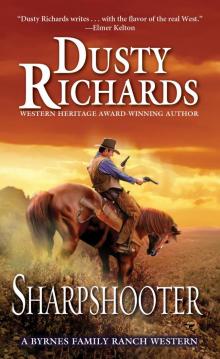 Sharpshooter
Sharpshooter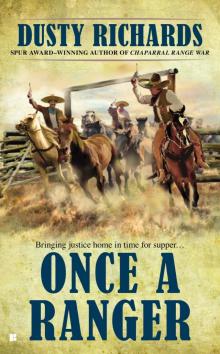 Once a Ranger
Once a Ranger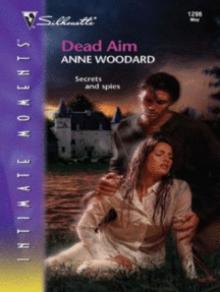 Dead Aim
Dead Aim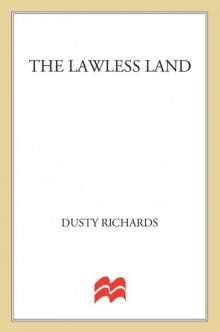 Lawless Land
Lawless Land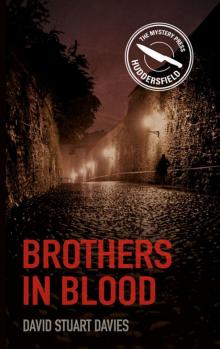 Brothers in Blood
Brothers in Blood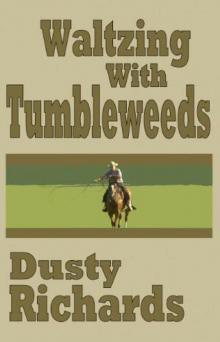 Waltzing With Tumbleweeds
Waltzing With Tumbleweeds